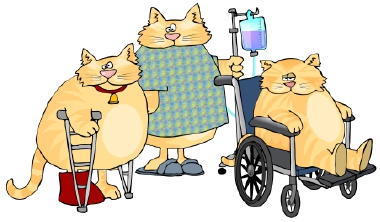Pet Health Insurance

When you first think of pet health insurance you look at your cat who is currently the picture of health. You take her for regular checkups and vaccinations and consult with your vet whenever your feline buddy isn't feeling so hot. You've always been able to find the necessary funds for veterinary care, and your pet is worth every penny.
But, have you considered what you'd do if your beloved feline developed a more serious problem, one that required expensive tests or treatments? There are numerous options...so ask numerous questions.
If you want to provide funds for sudden illness without involving a middleman (insurance) you may choose to deposit $30-$50 a month into a savings account that is specifically for your cat's care. So, now you have no third party involved, and all savings can go to pay your vet bill. Your money gets a little interest (not much nowadays), but the major disadvantage of this plan is that even if you have the discipline to save monthly, what if your catastrophe happens in 6 months or a year. You won't have enough put aside yet.
You might be able to work out an arrangement with your vet to pay over time, but there's no guarantee that he can do that. So, this is where the third party, the middleman, does come into play.
Pet Health Insurance is the safeguard you need when you least expect it. You are also buying peace of mind. We insure our homes, our cars, our own health, and for some reason, people want to pay $50 a year for a pet and get full coverage. Pet Health Insurance is just that…insurance. It isn’t a prepaid medical plan. Ideally, a multi-step plan provides the options that your pet needs.
I find that without major accidents, each of my cats runs approx. $200 a year, just for checkups, shot maintenance and minor mishaps. So would it not be better to apply that money towards pet health insurance so that you can afford the best care for your pet if anything serious happens?
Today, affordable plans allow the owner to make decisions from the heart instead of the pocketbook. People spend over $9 billion a year on pet health care. Still, many practitioners don’t mention costly procedures to those without insurance, because they feel their clients may not be able to afford them.
Nevertheless, the option for the best possible care should be there for everyone. Veterinary medicine is meant to make the animal feel better for as long as possible, without losing quality of life.
However, better technology also means higher costs. Less than 20 years ago, many cats with cancer died…for two reasons: the limits of veterinary medicine and the inability of pet owners to pay the high cost of available treatment.
While these advancements in technology give vets the tools they need to save more lives, cost can be overwhelming. Pet health insurance provides the financial advantage owners need so doctors can use available technology to treat and save their pets.
For serious cat illness, euthanasia continues to be an acceptable option. However, cost shouldn’t determine whether or not the cat is put to sleep. Pet health insurance can help when the bottom line is money. There are a number of pet health insurance companies now and I will be listing 8 of them including, VPI, which was started in 1982 up to one of the most recent ones, Healthy Paws Pet Insurance.
- Pet Health Insurance questions that you need to ask:
- Does the policy include annual checkups? (Some plans have this, others do not)
- Does it pay for pre-existing conditions? (Some do, but the condition must be diagnosed after the insurance, not before. Usually if you insure a kitten and then find he has a congenital problem, it’ll be covered)
- Does it cover accidents, illnesses, and surgery?
- What are the exclusions? (This is a biggie to find out)
- Are the claims paid on the actual veterinarian’s charges or is there a preset amount?
- Can you go to a veterinarian of your choice?
- What is the reimbursement percentage?
- Is there an annual limit?
- Is there a deductible? If so, is it a yearly deductible or per incident?
- Do the premiums vary by breed?
- Do the premiums rise as the pet ages?
- What is the waiting period between signing up your pet for coverage and being able to use it?
- Does your policy cover routine cat wellness care or do you need an upgraded plan in order to get this?
Then there are the normal questions such as ….is pet health insurance worth it? Remember that pet health insurance protects you from large, unexpected vet bills. If you are the type of owner who does not want to choose between going into debt or putting your pet down, then pet health insurance is for you.
Simply do your due diligence in researching the best options for your particular pet and situation. As consumers, we are responsible for doing research and understanding the rules. Most of the companies are pretty upfront about what they do and don’t cover.
Read the exclusion list and the reimbursement schedule. Take the time to understand what you are paying for and ask questions if you don’t understand. Some insurance plans cover accidents to your pet, but not cat illnesses…some plans cover treatment for cancer, some don’t. It can be confusing. Don’t just look at the lowest price. A low price is no bargain if your insurance company denies your pet’s claim. Cheaper policies tend to provide less coverage. Will the cheapest pet policy cover your cat’s cancer treatment? Probably not.
- There are actually four basic features of pet health insurance:
- Accident Coverage When accidents occur they are always unplanned and unexpected. This coverage insures a cat gets the best care, while relieving the owner of the stress of weighing their wallet against their pet’s life. This coverage does tend to increase the premium, since insurance companies reimburse a large sum in case of accidents.
- Cat Illness Coverage This coverage is included in almost all pet policies. It is important for owners to research their cats breed to find out what illnesses they are predisposed to and then make sure that their pet health insurance policy will cover it.
- Routine Health Coverage This is the most basic coverage offered in a pet insurance policy. This feature also tends to increase premiums, but for good reason. The premiums are insignificant compared to what an owner would pay out-of-pocket for routine check-ups….something that becomes more necessary as pets age.
- Death Cremation and Burial Coverage Pet owners are treating their beloved animals with much more respect than in the past. Pets are now given funerals, separate tombs or are cremated, all of which can be costly. Also, all of which can be financially-aided by insurance.
Pre-existing conditions are not covered. Try buying auto insurance after you’ve wrecked the car…it won’t be covered. The same is true for pet insurance. Also, with human health insurance, your doctor invoices the insurance company and you may never see the bill. But with a pet policy, you have to pay your vet bill and then submit your claim to your insurance company for reimbursement.
Some people think that they will just save a few dollars each month and the money will be there to cover unexpected pet accidents but how many really follow through? If you have the discipline, it's a good start but this concept also assumes that nothing will happen to your pet until much further down the road when the piggy bank is fuller.
But what happens if there is an emergency in the near future? There are bills, loans, house payments, car payments and groceries. How much will really be saved to pay the medical costs if something drastic happens? Accidents can happen anytime. Indoor pets can run out the door and get into trouble or they can have dental problems crop up.
Regular check-ups detect critical health issues early, for the best chance of recovery. Do you really want to put your pet down because you can’t afford the medical costs?
You can pick and choose which benefits you want within your plan. Filing a claim can be as simple as downloading a claim form from the insurance company's website. You can enroll a pet as young as 8 weeks old but young pets can be fragile and curious putting them at risk for accidents. It is best to enroll before symptoms of a pre-existing condition or illness occur, to make sure your pet is going to be covered for anything he/she might need.
Enrolling your pet as a youngster can also mean locking in your rate until they reach maturity. Some companies won't enroll a pet over 10 years old, so be sure to clarify this when doing your research if you have a senior animal. Many of the companies also offer multiple pet discounts if you have more than one animal.
It doesn’t have to cost an arm and a leg for insurance if you wisely choose the options that fit you and your cat buddy. Every pet deserves to be well-taken care of and having the financial resources to care for our pets is a primary responsibility.
Things happen in life….you lose your job…you have a major illness of your own to deal with…you have to make priorities that affect both your pets and your family…while you face struggling to keep your home insurance you also need to consider both your own health insurance and your pet health insurance. But, let’s face it, when it gets down to that level every dollar counts.
If you wait until after your pet gets sick or injured, it is too late to buy pet health insurance for that event, especially if you have a breed that is predisposed to certain diseases. If your pet shows symptoms or is diagnosed prior to enrolling with a pet insurer, it can be considered a pre-existing condition and may not be covered. Just like a human hospital bill, vet fees can add up even for the simplest of procedures.
Many pet health insurance plans cover tests, treatment of qualified accidents and illnesses, veterinary visits, X-rays, MRI's, CAT scans, hospitalization, prescription food and medications.
Although this researching of pet health insurance plans may seem time consuming, consider how much more time and how many more years you may be able to spend with your pet by having the best pet health insurance and medical care available...and being able to afford it.
The following companies and some of their plans are based on the insurance website examples of a cat under 1 year old which is the cheapest example. So, I got quotes for my cat Coty who is just turning 4 years old. Both are domestic shorthairs, not exotic breeds nor purebreds. Younger cats may be less costly while older cat plans will probably be higher.
The quotes I got for Coty are just an example and you will have to research
your own cat by breed, by age and particular needs. The example is only
meant to give you a ballpark idea. Depending on the options that you
choose for your cat, it can give you peace of mind knowing that your cat
is covered at a reasonable cost...so choose according to your cat's
specific needs...and choose wisely to either get your cat full coverage
or to keep your costs down.
- Pets Best: (Accident B) $5.58+ $200 deductible. Cover accidents to 80% Accidents only.
- Pet Plan: (Gold) $9.45+ $200 deductible. Cover all accidents, injuries & illnesses for life of pet 90% reimbursement
- Healthy Paws: (Cats/Kittens) $12.29+ Up to 90% of vet bill for any accident or illness including hereditary/congenital conditions. Customizable
- Purina Care: (Without Preventative Care) $10.41 $250 annual deductible. Pays 80% of eligible expenses after deductible and co-pay. Covers all accidents & illnesses
- Purina Care: (With Preventative Care) $15.21 Same as above plus includes spay/neuter, annual exams, flea & heartworm medications.
- VPI: (Standard) $9.83 $50 deductible. Pays 90% of approved claim. Covers select accidents & illnesses
- Trupanion: (Standard) $10.52 All policies pay 90% of your vet bill for any accident or illness. Deductibles & premiums are adjustable to meet pet owner’s needs
- Embrace: (Most Popular) $12.26+ $300 annual deductible, 20% co-pay, $5,000 annual maximum, no per incident limits. Covers accidents & illnesses, genetic & chronic conditions, prescription drugs. Does not cover dental illness or wellness.
- Embrace: Budget $8.38 $300 annual deductible, 20% co-pay, $2,000 annual maximum, no per incident limits. Covers accidents & illness, genetic & chronic conditions. Does not cover take home prescription drugs, dental illness or wellness
- ASPCA: (Level 2) $16.19 80% coverage, $100 annual deductible, $1500 per incident limit, $8,000 annual limit.
The health care cost plan you select will depend on a number of factors, including the number, ages, and overall health of your cats, as well as your financial situation. If you have a moderate, steady income and financial discipline, a savings account dedicated to your cats needs might be the best bet.
If your income varies seasonally and/or you move often...which would require frequent changes in veterinarians...pet health insurance might be the answer. Whichever option you choose, you'll be comforted to know you don't have to raid your retirement fund to give your cat the best possible health care.
Related Articles......
Return from Pet Health Insurance to Cat Health Homepage
Having trouble finding what you need? Cat Health Index & Site Map
OR
Do you have a question to ask?...Questions
OR
Do you have a cat story to share?...Simply click here to go to that page!
Copyright@2010-2020 All rights reserved.Cat-health-detective.com
This website is information only. Consult a veterinarian for medical assistance

"Like Us" on Facebook
or...
"Like Us" here




















